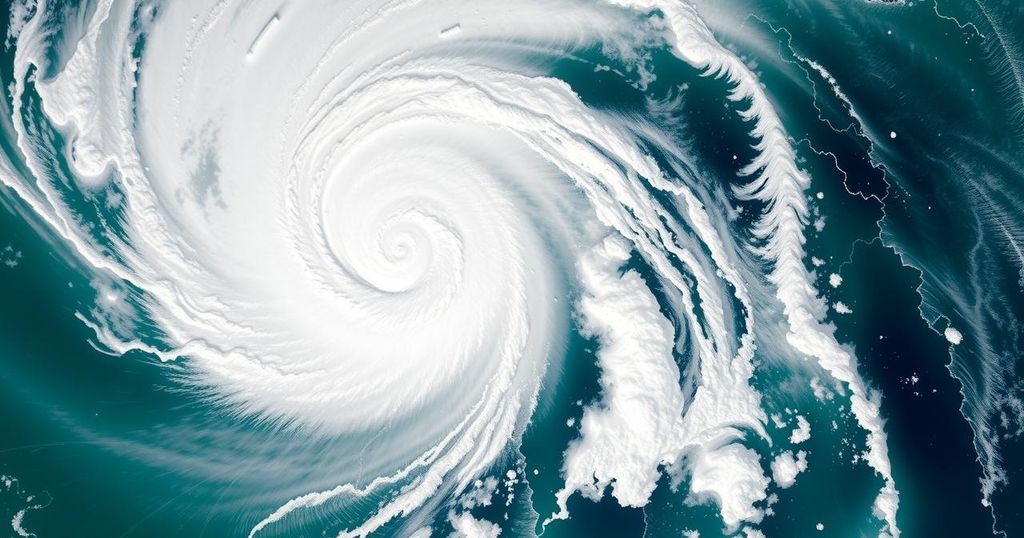Madagascar and Southern Africa Brace for Impact of Cyclone Chido
Tropical Cyclone Chido is impacting Mayotte, Comoros, and is expected to affect Mozambique and Malawi. Over 2.5 million people may be at risk of flooding and mudslides. Authorities are actively engaged in damage assessments and preparedness efforts as weather predictions indicate severe conditions.
As of December 14, Tropical Cyclone Chido has impacted areas in Mayotte and the Comoros, with forecasts indicating it will bring severe winds and heavy rainfall capable of causing flooding and mudslides across Southern Africa. Approximately 2.5 million people reside in the areas predicted to be affected, which includes over 1.7 million in Mozambique, 440,000 in Malawi, and almost 370,000 in the Comoros. The cyclone passed near Madagascar on December 13, but no damage or casualties have been reported, and cyclone warnings along the northwestern coast of Madagascar have been rescinded.
Authorities in the region are actively issuing advisories and preparing for potential impacts. In Mayotte, Chido has caused flooding and hazardous maritime conditions. Historical comparisons have been made, noting that the cyclone’s wind intensity is unprecedented since Tropical Kamisy in 1984. It is anticipated that weather conditions in Mayotte will improve significantly by the end of the day as the cyclone moves westward.
The cyclone is predicted to traverse the Mozambique Channel, reaching northern Mozambique by December 15. In the Comoros, severe weather has already led to significant damage, including destroyed homes in Anjouan and ongoing searches for missing fishermen in Ngazidja. Mozambique is preparing for damaging winds and heavy rains, with coastal areas bracing for rainfalls of up to 200mm and high seas. Meanwhile, heavy rainfall exceeding 150mm is expected across parts of northern Mozambique, Malawi, Zimbabwe, and Zambia in the days ahead, heightening the risk of flash floods.
Emergency response efforts have been activated across the region. The Southern African Development Community (SADC) has commenced daily monitoring of the situation, providing recommendations for preparedness and relief efforts. The Comorian National Meteorological Service has issued a cyclone alert and activated disaster response plans, while Mozambique’s meteorological service has warned of significant impacts expected in vulnerable provinces. Meanwhile, Malawi has also mobilized its resources to address potential disruptions caused by Cyclone Chido.
As authorities emphasize the importance of preparedness, they continue to monitor the cyclone’s path and assess the damages incurred. The situation remains fluid, and ongoing updates from meteorological services and humanitarian organizations are vital to ensure effective response efforts.
The article discusses the impacts of Tropical Cyclone Chido, particularly its effects on Madagascar, Mayotte, Comoros, Mozambique, and Malawi. Tropical cyclones are significant weather phenomena that can cause severe damage in affected regions, particularly in Southern Africa, where millions are at risk from flooding and landslides. The regional governments and humanitarian organizations are actively mobilizing resources and preparing for possible humanitarian crises. Cyclone Chido’s trajectory, intensity, and potential impact underscore the need for effective emergency response and preparation within affected communities.
In summary, Tropical Cyclone Chido poses a significant threat to millions across Southern Africa, necessitating comprehensive disaster preparedness and response measures. While Madagascar has so far reported no casualties, ongoing evaluations and preparations are essential as the storm progresses towards Mozambique. The broader regional response showcases the collaboration between national authorities and organizations to mitigate risks and ensure the safety of those in vulnerable areas.
Original Source: allafrica.com




Post Comment